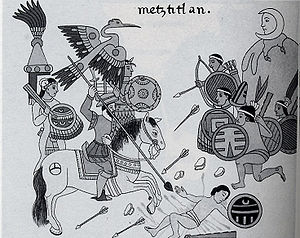文化衝擊

文化衝擊,或文化震驚、文化休克(英語:culture shock),是指一個人或者一個組織身處不同國家的文化或不一樣的環境中而經受的一種困惑、焦慮的狀況,未必會產生嚴重後果。該詞在1954年由Kalervo Oberg首先提出。Michael Winkelman等其他學者隨後展開了對文化衝擊的研究工作。文化衝擊的研究領域屬於跨文化交際。
四個階段
[編輯]文化衝擊主要有四個階段,主要預測本身的文化(Heritage culture)與新的文化(Host culture)的相互影響。

蜜月期
[編輯]在這個階段,新文化和舊文化之間的差別之處 會迸發出浪漫的火花。例如,初到一個新的國家,人們可能會愛上這裡的新奇的食物、生活的節奏、還有當地人不同的生活習慣。在這最初的幾周內,大多數人都會被這些新的文化所深深地吸引。人們會和那些講著當地語言的並且對外國人十分有禮貌的當地人愉快地交流。 就像大多數蜜月一樣,這樣的階段最終會告一段落[3]。
過渡期
[編輯]一段時間之後(大約三個月,每個人的時間都不同),新舊文化的不同之處漸漸越來越明顯,進而會產生很多焦慮。隨著各種困難帶來的挫敗感和持續經歷不愉快的事情帶來的憤怒,新文化的興奮感最終會消失殆盡。這最終會導致人們對新文化產生抵制情緒。 在這個階段,體驗者開始逐漸意識到生活在異國的不便——主要體現在對於語言,交通,購物,飲食等等日常生活的小細節上。因此體驗者會在心理上受挫敗感。對於「新家」和「舊家」都有說不清的矛盾心態。對於新家,體驗者有著排斥和冷眼相待的心態。比如說,總是刻意扭曲當地人的行為和語言,潛意識的對當地人產生種族偏見。對於「舊家」,也因為有種報喜不報憂的心態,以至於與之前的關係網絡脫節。在這個階段,體驗者容易抑鬱。 此階段最終要的變化是溝通:人們在適應一個新文化的時候,往往會因為不適應新環境和見不到熟悉的人而感到孤獨、想家。 例如,留學生在異國他鄉時,可能會:
調整期
[編輯]同樣的,一段時間之後(通常6-12個月),人們慢慢地熟悉了新的文化,並且形成了新的日常生活習慣。他們知道在現階段應該期待的是什麼,並且現在的國家並不像最開始感覺的那麼新奇特。人們開始重新關注基本的生活,並且日常生活變得「正常」起來。他們開始慢慢地尋找解決文化困難的方法,並且積極地接受這個新的文化。新的文化慢慢地在人們心中形成,並且對文化消極的舉動和反應正在慢慢減少。
適應/融入期
[編輯]最終階段是人們能夠完全地融入進新文化,並且感到很舒適愉快。最終階段不是指全部人生的最終階段,人們總是在會在各種新文化的初期感到衝擊,比如口音、語言。 經歷了低潮一般的掙扎期,體驗者開始逐漸接受了新環境和新的思維方式。他/她可以意識到其實人都是社會的產物所以當他站在一個新的文化和歷史的視角看問題,穿著當地人的鞋走當地的路時,他/她對於在第二階段產生的偏見逐漸消除。同時,語言的進步,人際關係的加強也會讓受到文化衝擊的體驗者更加自信起來。最後,體驗者能夠為「新家」作貢獻也被「新家」的成員所接受。這樣就開始了建立新生活的良好周期。大部分人在這個階段自我定義為多元化人,因為他們能夠同時從多個文化背景出發看待,解釋和處理問題。
逆文化衝擊
[編輯]一些適應外國生活的人在回國後亦會感到難以適應本國的生活,這種現象稱為逆文化衝擊(Reverse culture shock,又作re-entry shock或own culture shock[4])。有人認為這背後有理想化和期待兩種原因。當人們在國外生活時,往往會美化自己的記憶,專注於母國美好的一面;而另一方面,人們又往往會在潛意識中期待,自己在國外生活時,母國不會發生任何變化。因此在回國之後,種種不適應便造成了逆文化衝擊的產生[5]。
影響人們適應因素
[編輯]距離遠近
[編輯]文化上,另一地方的語言或行為與自身成長地方差很大的話較難適應。如氣候上,馬來西亞人比芬蘭的人更易適應新加坡的文化。或者語言上,德國人比起法國人更易適應英國的生活。
個人與另一文化契合程度
[編輯]如果某人是一個嚴謹的個人主義者,他會比較適合一些個人主義的國家,如美國。
適應策略
[編輯]心理學家Berry歸納出一個四分模型來解釋人們的適應策略。
| 四分模型 | 對外來文化 | ||
|---|---|---|---|
| 更負面 | 更正面 | ||
| 對本身文化 | 更正面 | 排外 | 整合 |
| 更負面 | 解構 | 同化 | |
The fourfold model is a bilinear model that categorizes acculturation strategies along two dimensions. The first dimension concerns the retention or rejection of an individual's minority or native culture (i.e. "Is it considered to be of value to maintain one's identity and characteristics?"), whereas the second dimension concerns the adoption or rejection of the dominant group or host culture. ("Is it considered to be of value to maintain relationships with the larger society?") From this, four acculturation strategies emerge.[6]
- 同化 occurs when individuals adopt the cultural norms of a dominant or host culture, over their original culture. Sometimes it is forced by governments.
- 排外 occurs when individuals reject the dominant or host culture in favor of preserving their culture of origin. Separation is often facilitated by immigration to ethnic enclaves.
- 整合 occurs when individuals are able to adopt the cultural norms of the dominant or host culture while maintaining their culture of origin. Integration leads to, and is often synonymous with biculturalism.
- 解構 occurs when individuals reject both their culture of origin and the dominant host culture.
Studies suggest that individuals' respective acculturation strategy can differ between their private and public life spheres.[7] For instance, an individual may reject the values and norms of the dominant culture in his private life (separation), whereas he might adapt to the dominant culture in public parts of his life (i.e., integration or assimilation).
像語言學習,文化也有學習關鍵期。例如香港往加拿大移民跨年齡研究中發現,住了20年後,0-15歲的人會比16-30歲的人更認同加拿大的文化[8]。換言之,年紀較大的人們即使在新地方生活了很久,他們還是大多自覺自己是原本文化的人,較難從心裏認同新的文化。
參見
[編輯]參考文獻
[編輯]引用
[編輯]- ^ Black, J. Stewart; Mendenhall, Mark. The U-Curve Adjustment Hypothesis Revisited: A Review and Theoretical Framework. Journal of International Business Studies. 1991-06, 22 (2): 225–247. ISSN 0047-2506. doi:10.1057/palgrave.jibs.8490301.
- ^ Harbaugh, William; Levinson, Arik; Wilson, David. Reexamining the Empirical Evidence for an Environmental Kuznets Curve. Cambridge, MA. 2000-05.
- ^ Oberg, Kalervo. Cultural Shock: Adjustment to New Cultural Environments. Practical Anthropology. 1960-07, os–7 (4): 177–182. ISSN 0032-633X. doi:10.1177/009182966000700405.
- ^ Woesler, M. A New Model of Cross Cultural Communication: Critically Reviewing, Combining and Further Developing the Basic Models of Permutter, Yoshikawa, Hall, Hofstede, Thomas, Hallpike, and the Social Constructivism. Comparative cultural science 1. Bochum/Berlin: European University Press. 2006 [2022-06-07]. ISBN 978-3-89966-188-0. OCLC 180723503. (原始內容存檔於2022-06-07).
- ^ Martin, Hank "Dealing with Reverse Culture Shock." Breaking Trail Online. http://brktrail.com/rshock/ (頁面存檔備份,存於網際網路檔案館)
- ^ Berry, John W. Immigration, Acculturation, and Adaptation. Applied Psychology. 1997, 46 (1): 10. doi:10.1111/j.1464-0597.1997.tb01087.x.
- ^ Arends-Tóth, Judit; van de Vijver, Fons J. R. Domains and dimensions in acculturation: Implicit theories of Turkish–Dutch. International Journal of Intercultural Relations. February 2004, 28 (1): 19–35. doi:10.1016/j.ijintrel.2003.09.001.
- ^ Cheung, Benjamin Y.; Chudek, Maciej; Heine, Steven J. Evidence for a sensitive period for acculturation: younger immigrants report acculturating at a faster rate. Psychological Science. 2011-02, 22 (2): 147–152 [2019-03-21]. ISSN 1467-9280. PMID 21189354. doi:10.1177/0956797610394661. (原始內容存檔於2019-05-18).
文獻
[編輯]- Macionis, John, and Linda Gerber. "Chapter 3 - Culture." Sociology. 7th edition ed. Toronto, ON: Pearson Canada Inc., 2010. 54. Print.
- Pedersen, Paul. The Five Stages of Culture Shock: Critical Incidents Around the World. Contributions in psychology, no. 25. Westport, Conn: Greenwood Press, 1995.
- Barna, LaRay M. "HOW CULTURE SHOCK AFFECTS COMMUNICATION." Communication 5.1 (n.d.): 1-18. SocINDEX with Full Text. EBSCO.29 Sept.2009.web.
- Oberg, Dr. Kalervo. "Culture Shock and the problem of Adjustment to the new cultural environments". World Wide Classroom Consortium for International Education & Multicultural studies. 29 Sept 2009.
- Mavrides, Gregory PhD 「Culture Shock and Clinical Depression.」 Foreign Teachers Guide to Living and Working in China. Middle Kingdom Life, 2009. Web. 29 Sept. 2009.
- https://web.archive.org/web/20171004135950/http://www.thewanderlanders.com/the-four-stages-of-adjusting-to-a-new-culture/
